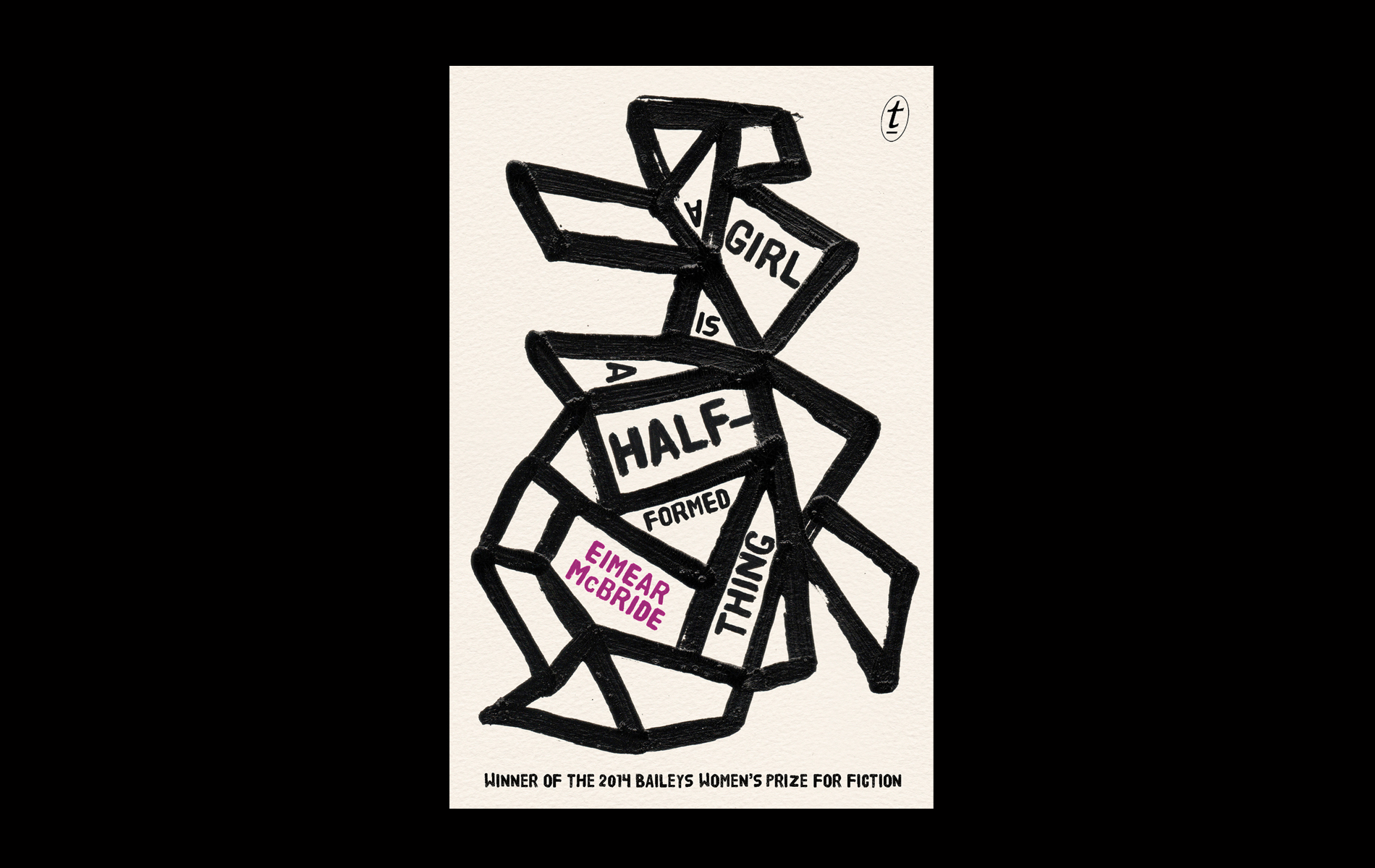McBride’s rich new novel explores family loyalty through the eyes of an Irish Catholic sister.
by JoAnna Novak
A Girl Is a Half-Formed Thing by Eimear McBride is stacked with acclaim and worth every bit of it. A quick Googling (or turning over of the book-proper) will tell you that McBride wrote the book when she was 27 and spent the next seven years searching for a publisher. Her patience was rewarded with a slew of literary nods: Winner of both the Goldsmiths Prize and Bailey’s Women’s Prize for Fiction in 2014, as well as a finalist for the Folio Prize in 2014.
Beyond the merit-based hype is the attention the novel has received for McBride’s gyroscopic language, which runs Irish dialect through an extruder, pushing out snips and phrases, fragments and blips. Consider the first sentences: “For you. You’ll soon. You’ll give her name. In the stitches of her skin she’ll wear your say. Mammy me? Yes you. Bounce the bed, I’d say. I’d say that’s what you did. Then lay you down. They cut you round. Wait and hour and day.”
Elisions, hiccups and portmanteaus abound in this novel, but to focus on the syntactical novelties would be to neglect this story’s heart.
Set in Ireland, in the not-so-distant past (walkmans and home video games exist), A Girl Is a Half-Formed Thing is a coming-of-age story told through one Catholic family’s struggle to cope with trauma. The unnamed narrator, the daughter in this family, is born shortly after her older brother miraculously survives childhood brain cancer.
From the first page, when McBride’s narrator reports “You’ll give her name,” the reader knows that the siblings’ identities are inextricable. “You” throughout the novel refers to the narrator’s brother, and the namelessness of all characters—but especially the siblings—underlines how connected our familial identities are. Mother is to daughter as sister is to brother, identities that exist in relation to another, a loved one. A Girl Is a Half-Formed Thing, from its title on, preaches the unwavering solidarity of family.
As the siblings grow up, their relationship takes both usual and unexpected turns. When they’re young, the children are companionable (“having slug scum races from the doorway to the source where it is”); later, in their teenage years, the narrator finds herself ashamed by her brother because he lies about the cause of the scar across his forehead, explaining it as the result of a knife rather than a life-or-death surgery. The narrator’s brother is a survivor, one with lingering side effects (left hazy to the reader), and though the narrator and her mother see the boy’s limitations, he does not.
When the siblings are in school together, for instance, the narrator witnesses her brother struggling to fit in with a group of football-playing boys:
“In the cold lunch break they are kicking football on he muck pitch. You run. Run. Run. That bad eye I know cannot keep up with a ball nor does it see one of them and his doing you for the crowd. Behind your back. For their laughter a mighty thing to invoke. Your little limp. Sometimes the way you shake your head. It’s brilliant that the worst one on the whole field doesn’t know it. See him do it. For their roaring. For their great lads fun. He does your voice like a thick tongue.”
This scene is never interrupted by the narrator intervening. Rather, McBride again and again allows readers to confront those moments imbued with embarrassment and, later, regret.
Tension muddies the water between brother and sister as the narrator attempts to push the normal limits of Irish Catholic adolescence: she drinks and smokes, okay, but it is through her deviant sexuality (promiscuity, an ongoing sexual relationship with her uncle) that she discovers a greater distraction from the engulfing problems back home.
What are the problems at home? Primarily, the narrator struggles with her mother, a stern, disciplinarian chained to her Catholic faith. Most at odds with her mother’s religious fervor is narrator’s conflicting drive both for desirability and “those things that happen in your head when you are young and cannot fathom never being clean again.”
When the narrator leaves home for college, her sexual exploits with anonymous men become more frequent—but also more recognizable. Now the narrator has a girl friend, with whom she barhops and picks up men. But when the narrator learns her brother’s cancer has returned, a sudden homecoming leads to a whirlpool of emotional intensity, when the narrator will subject her body to anything to suffocate the sadness: “Hurt me. Until I am outside pain.”
But the pain pulsing within A Girl Is a Half-Formed Thing isn’t all dark and gory. The most painful—and the most poignant—facet of this novel is the relationship McBride creates between the narrator and her brother, who she addresses directly (“you”) throughout the book. By the end of the novel, when the siblings are quite far from slug races, the narrator’s question—“What if we were young, were small again?”—is liable to break your heart.
JoAnna Novak is the Pushcart-Prize-




